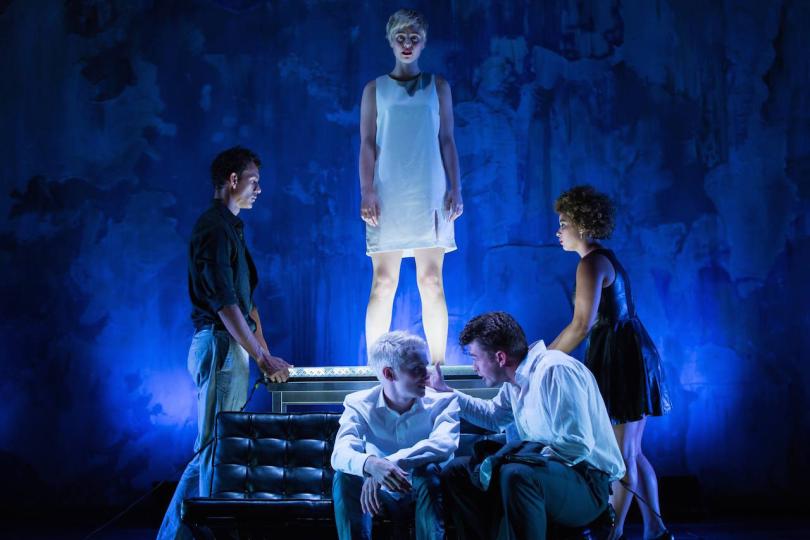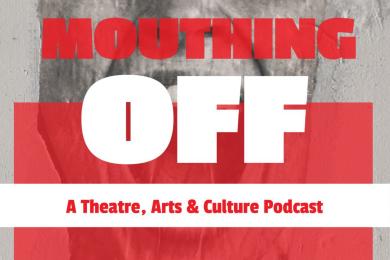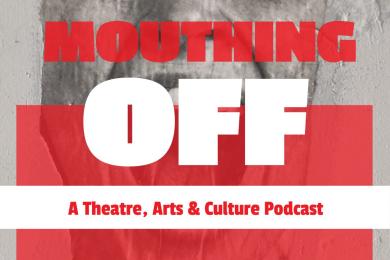Emerging Artist Profile: Joseph Stodola

If any of you have seen a New Epic Theater production recently, you will see a desire to go beyond stagings that convey “well, that’s how this play is done.” Artistic Director Joseph Stodola is beginning to create a name for himself as a bold, visual director - doing away with traditional staging, much like Peter Brooks did with his famous 1970s production of Midsummer Night’s Dream. I’m not (yet) comparing this under-30 director to the legendary Peter Brooks, but his unique scenography and Brechtian-infused conventions does share artistic notes with the English auteur. That boldness was what drew me to Stodola’s work as an emerging director.
So, Joseph, who are you?
I am from the Twin CIties. I grew up in a very conservative suburb (Lakeville). Still I think a bastion of Republican conservatism in the south metro. I sort of knew I wanted to do art of some kind at a very young age, but really wasn’t given the opportunity to do it till much later. I was a football kid for a little while initially, but auditioned for a production of the Crucible and quit the football team to do that instead. That sort of began theater for me. . . Theater just sort of seemed to match the skillset I had and spoke to more of what I was interested in. I went to the University of Minnesota for a B.A in English, but I took a lot of theater classes. Especially as I knew that directing was definitely something I wanted to do --it seemed more useful to have that background information [in theater]. I was also very focused on writing in college, so a lot of my work as a director is very related to the text.
Do you feel not having a piece of paper that says, "I have a theater degree" puts you at a disadvantage?
I might have a theater degree actually! I haven’t looked at my diploma since I graduated; I took a lot of English classes that counted towards a Theater major. But the English major classes informs me more as a director. I did take three course with Lou Bellamy when he was a professor there, and he sort of [also] informed the way I think of the role as the director, in the room and with the text.
Getting directing jobs are some of the hardest in theater - there are no auditions, portfolio reviews, or submissions. How have you gotten directing gigs?
I got a lot of my assistant directing jobs by just asking. I either had a contact through a professor or through a friend and that sort of paved the way for the initial ask. But I was also careful to really only ask directors I knew I shared a similar sensibility with because I wanted to learn how that would end up playing out, for someone like myself. Directing jobs either have come to me from out of the blue - like receiving an e-mail from someone I didn’t know yet - or, most of them actually, have come because I have willed it into being - whether through the Fringe Festival or through my own unwillingness to give up on doing projects.
Who (or what) are some of your influences? Either with your Art (with a capital A) or with your directing style?
I have assisted Peter Rothstein on a number of things and that has been a really nice relationship to have. He is very good at what he does, and I think his mastery of the craft is inspiring. His energy is very giving and very positive; I do really respect how open a dialogue around the rehearsal process he creates. It does feel like he encourages the artists to advocate on behalf of the work. I don’t think I mimic the way he does it, however.
You are the founder and artistic director of New Epic Theater. Why New Epic? Why start a company?
New Epic was started because I felt like I have a place in the theater ecology of this town; that maybe the work that I desire to do is different than what’s being done. I never thought of myself as someone who would go and start a theater. It happened by virtue of my understanding that the work I wanted to do is not being done elsewhere. And that’s not to say that I don’t admire the work of [other] companies and or that they are not doing work that is interesting to me, it just seemed like my style isn’t necessarily reflected. I believe theater is an overtly political act, and I know people agree with that statement, but I do not think it is an understatement to say that all theater is political.
Political in what sense? Like politics or commenting on social norms and structure?
Both of those things, actually, in equal measure. I think it is the role of the artist to speak on where we are as a society and who we are as human beings here and now. I do believe that's reflected in what a play says about society and therefore it is politics. It is about representation. It is about democracy - and all those big, American words.
How does New Epic Theater function? Administratively? Artistically?
My role is as founder and artistic director which means the work is largely curated by what I believe is most reflected in the world. It is important to me that the plays speak to our current situation as much as possible and be reflective of the community where they are being presented. That is my work as Artistic Director. A really dear friend of mine is my Managing Director; his name is James Kunz. It is the textbook definition of that position, but our relationship is very much equal because he is very good with things I am not very good at, and vice-versa. So our relationship is entirely symbiotic. I also have a number of associated artists -as I like to call them - that I prefer to work with a lot. We have a really productive working relationship, but we really challenge each other. Adam Qualls, who does a lot of musical theater in town, is one and Torsten Johnson, who came through the BFA Guthrie Program. He has a wholly individual way of looking at theater that is different enough than my own. He forces me to know what I am talking about. That is something I really appreciate in the room as a director. I have also worked a lot with Aeysha Kinnunen - another BFA Guthrie graduate.
However, we have gotten to use the Lab Theater as a home for us. I did a play, One Arm, at the Fringe, and the owner asked me to remount a full-length version of it. The Lab also really fits the aesthetic component of my work, which is very “anti-your traditional theater space.” After that initial Lab production, we began thinking in terms of the Lab as our home.
New Epic’s name is a direct reference Brecht’s Epic Theater - kind of obvious there. This seems to be very heavily rooted in your company; what drew you to Brecht? Why his theatrical dogma?
I was never exposed to Brecht’s work through studies. It actually sort of came in the reverse. I was interested in studying the work of directors I admired, and I noticed this common thread that they all sort of were able to lean on his (Brecht’s) theories for inspiration. So I guess through them, I was able to come back to Brecht. It wasn’t born out of an educational circumstance, it was the opposite.
Would you ever do a Brecht script with New Epic?
Absolutely. It will happen sooner rather than later; it is something as a company we are sort of working up to. His work takes on a magnitude. I am more personally inspired by the work of playwrights that owe a lot of their thoughts to Brecht, like Tony Kushner. His Angels in America is so Brecht - it is almost wholesale lifted from Brecht. But it has this heartbeat to it.
So on that then, how do you incorporate his style into plays that are not, on the surface, Brechtian?
That is one of the fascinating things. I think in America, we default to Realism. I think we default to this homogenized aesthetic that doesn't let the work breathe its own life. It is fascinating to me to take work that we assume lives in a certain context and move it to another. But frankly, if you read The Normal Heart, which I am directing next, that thing is almost pure Brecht sometimes--down to the times when they employed projections to tell us the the locations (used in the original production). There was no attempt at scenic realism; you have these long speeches which the actor might as well turn to the audience and tell at them! If done as realism, it seems you’re robbing the intention of the playwright.
One of the aspects that has impressed me the most with New Epic, was the growth of the company. You employ Equity actors only a year or so after doing a Fringe show. How have you done that? How have you gained such a growth within the company?
It is a good question but to be honest with you, being inside of it, I don’t actually have the answer for how it happened. No one died and gave me money - that’s definitely not the case; my bank account will tell you that. There are these artistic priorities for me to have an artist. For me, if they are important, you do the things you have to in order to accomplish it. I wish I could pinpoint one thing particularly, but it really comes out of sheer force of will. We have our Small Professional Theater Contract with Actor’s Equity because those are the artists we want to work with, and it was important enough to us for budgeting and in terms of our artistic sensibility that if we want to work with artists who are union, then we pay them accordingly. You have to say that is important.
Have you been taking a paycheck?
No, I have not been taking a paycheck for my work with New Epic. I would love to but I am not the priority - the work is the priority. If a successful execution of that work means money going to not me, then I am OK with that.
In terms of fundraising, have you done grants at all?
We are just getting into grants. We are fiscally sponsored through Springboard for the Arts. I have a feeling we will be 501(c)3 really soon.
Would you recommend Springboard?
It has been valuable in the sense that it has opened up a lot of channels, such as asking for a grant. You really can’t ask for a grant unless you are fiscally sponsored or you are a 501(c)3. It is almost important to me that people who donate to the theater can do so with a level of confidence and having Springboard for the Artists is reassuring for them, as well they can make their donations tax deductible - which those who make large gifts really appreciate.
We haven’t done crowdsourcing all that much - not as much as I think we could or should. We have started to; we have a Kickstarter. . . for Coriolanus/The Normal Heart. That is such a completely different approach to theater as a whole. Crowdsourcing is so much more than the money you are raising but more about the relationships you are cultivating. We want our audience to be able to feel that they are connected to the process.
What is your process,then, as a director?
I like to think the process is slightly different for every play but ultimately it means that the play stays in my consciousness.
I start my process by thinking about the environment that the play takes place. And not necessarily the physical space, but I feel that the physical space is a consequence of that. When I direct a play, I almost always design the set. It is born out of that when I start to think of a play clearly, it comes in pictures. I also have this really, really deep seated interest in architecture and design and composition; I studied a lot of painting. So set design for me is born out of that desire to create a really clear environment for storytelling to take place. It is always a very symbolic or metaphysical environment that is reflective of the themes and the play.
How do you balance being a young, hip fellow in Minneapolis making theater with your social life? Dating? Friends? Or even your day job?
I did have a day job, but I don’t right now. I managed a theater space at Chanhassen High School, but I stopped doing that with the more work I started taking as a director. There is a big difference between things I am passionate about and things I am not passionate about. And probably my sort of tragic flaw as a human being is that my ability to be completely passionate about something with my ability to will it into existence is equal to my ability to not care about something and have it fall through the cracks completely. And that is funny that you mentioned my social life because it may play into that as well! I think that theater for me is fairly all consuming. I really naturally an introvert so I don’t think of any part of my life as very social. I do have however have select relationships - both professional and personal - that I really make sure that I take care of those; they are important to have as a theater artist.
I am also very conscious about saving when I have steady work - like those 9 to 5’s. I knew that often times I will have a job and know that I will quit it at some point in the not-too-distant future. It has to become about keeping your bottom line as low and possible. For me, the freedom to be able to do work is worth sacrifices in other areas.
My work as an artist is either very isolated or in a rehearsal room. I am in either in a coffee shop or find the closest roaring fire, or I am up on my feet trying to problem solve [in rehearsal].
Graduate school is always a common option for artists - be it a golden path or a dark cloud looming above. Your thoughts?
I sort of set myself up with the expectation that I will have to do graduate school at some point but being a director doesn’t mean going to graduate school until you’re in your 30’s. You need that portfolio; it is that catch-22 in this field that you need to have the thing in order to get the thing. I do intend to do it if it feels like I am not still learning, but I gotta’ be honest with you Lucas that I am learning so much already. I have yet to find a time where graduate school seems like a viable option. The gears haven’t stopped or shifted that makes me think seriously about it at this point. But you’re right, it is at the back of my head. I think the primary reason I would go is to learn from the very established people. Over the degree itself. But I kind of got this theater company going so I want to see this thing to whatever endgame becomes possible with it.
So with all of that said, what is your advice for other young artists?
It is really hard to find people who think that theater is what I think theater is. It was never easy for me to be able to relate to people’s notions of theater; I wish I was less of an outlier. But I have been lucky enough to find a group of people with a mutual trust in each other. I don’t need people who have to agree with me. I do find it valuable that we can come at the play the we come at the play - the way that is internal to us. So I think it is really important early on to find people who--not necessarily think the way you think but who--you can be mutually respected collaborators with. If you admire their work as an artist, you can treat them the way they deserve to be treated, and vice-versa. Being part of a theater company is speaking the same language and that isn’t based on thinking the same way - my best days in the rehearsal room are when people’s ideas clash with one another. It forces me to broker a new agreement between artists. I surround myself with people who seem to understand my language.
Joseph Stodola Bio:
New Epic: Doubt, The Picture of Dorian Gray, One Arm.
Theater (as assistant director) Guthrie Theater: The Cocoanuts, A Christmas Carol, Other Desert Cities; Theater Latté Da: Company; Jungle Theater: Shipwrecked! An Entertainment; (as director) University of Minnesota/Guthrie: World Without End; International Thespian Festival: Detroit, Tribes, God of Carnage; Metamorphosis Opera: Médée; Young Artists’ Initiative: Oliver!
Training B.A., University of Minnesota.




